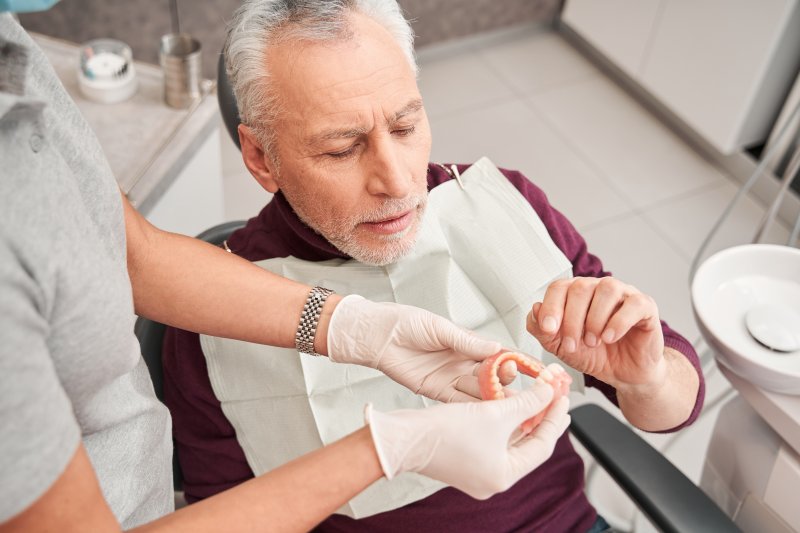
You may feel pretty good if you’ve just gotten dentures. After all, your new prosthetic teeth have restored your smile! That’s always a solid reason for a positive mood. Even so, you should know that there’s a connection between dentures and taste. As such, your restorations could sour a meal if you’re not careful. Your East Longmeadow dentist, fortunately, can keep that from happening. So, here’s how dentures can hurt your sense of taste and ways to keep them from doing so.
How Dentures Can Hurt Your Sense of Taste
Since dentures aren’t regular teeth, they can sometimes interfere with taste sensations. They’re pretty likely to do so in the following cases:
When They Don’t Fit Well
If your dentures start to fit poorly, you might rely on various creams to keep them in place. Unfortunately, these adhesives don’t mix well with your taste buds.
You see, denture creams often alter taste sensations. Users describe the material as having a “metallic” flavor that overwhelms feelings from foods or drinks. Overusing creams or adhesives, then, is likely to cause temporary taste loss.
When They Collect Food Deposits
Dentures build up food deposits and stains with daily use. However, this debris gathering can overwhelm your senses and contribute to taste loss.
As it happens, this problem especially applies to cheap dentures. These kinds use low-quality plastic that’s porous, which can make them pick up more odors and tastes.
When They Cover Your Palate
As you might know, some full upper dentures feature a base plate reaching your mouth’s roof. This plate ensures the prosthetic stays in place, but it can also hurt your sense of taste.
The issue is due to the many taste buds on the roof of a person’s mouth. When a denture’s base plate covers the palate, it also keeps those receptor cells from perceiving tastes.
How to Improve Taste Sensation
Thankfully, it’s simple to counteract the factors above and improve your taste sensation. In particular, consider the following options:
- Get Implants – Unlike other kinds, implant-retained dentures don’t rely on a base plate. As such, they wouldn’t cover the taste receptors in your mouth.
- Clean Your Dentures– If you’re worried about food deposits and stains, remember to clean your dentures daily with a soft-bristled toothbrush and the proper solution.
- Speak to a Dentist – Since taste loss can result from various factors, discussing the matter with a dentist is a good idea. They can perform an oral exam to determine the cause and provide effective treatments.
True enough, taste does naturally fade with age. That said, you don’t want this to occur more than necessary! Remember, then, to use the tips above so your food stays nice and tasty.
About the Practice
EMA Dental is based in Northampton, MA. Led by eight highly trained dentists, our practice offers comprehensive dental care for all. In particular, we perform preventive, cosmetic, and restorative treatments, as well as emergency procedures. Our office even has in-house prosthodontists — dentists who are experts at restoring smiles with prosthetics! For more information or to book a visit, you can reach us on our website or by phone at (413)-731-8800 or (141)-358-44900.
